Governance of tenure newsletter
EU Land Governance Programme -7th Capitalization Meeting
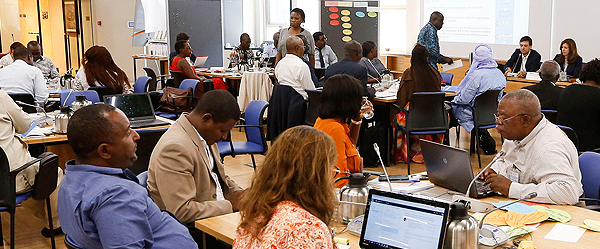 |
|---|
| © FAO / Giulio Napolitano |
The Capitalization Meeting on the EU Land Governance programme took place for the first time at FAO headquarters in Rome from 26 to 29 June 2018.
By means of FAO’s Transversal Project “Support to and capitalization on the EU Land Governance Programme”, co-funded by the EU and the Swiss Agency for Development and Cooperation (SDC), FAO coordinates, supports and consolidates the implementation of the EU Land Governance Programme in ten African countries (Angola, Burundi, Côte d’Ivoire, Ethiopia, Kenya, Malawi, Niger, Somalia, South Sudan and eSwatini) and has extended its support to eight additional countries located in Africa, Asia and South America (Brazil, Cameroon, Colombia, Ghana, Guinea Bissau, Pakistan, Sudan and Uganda) since 2015.
Capitalization meetings are a cornerstone of the Transversal Project. The objectives of these gatherings are to assess progress in implementation, develop capacity of project teams, share experiences and lessons learned, and provide a platform for networking and interaction among country level project implementers to improve performance.
Click here for the event page
Click here for the webpage of the EU Land Governance Programme
Cambodia identifies the capacities to be strengthened of the Voluntary Guidelines on the Responsible Governance of Tenure of Land, Fisheries and Forests
 |
|---|
| © FAO Cambodia |
The Cambodian Ministry of Environment organized a national workshop on strengthening capacities on the VGGT from 5 to 8 June 2018, in collaboration with FAO and with the support of the Swiss Agency for Development and Cooperation (SDC). Around 90 people attended this first VGGT workshop for national and subnational government officials from relevant ministries, working on agriculture, environment, land, fisheries and forests.
Speaking at the opening of the workshop, H.E. Kim Nong, Deputy Director of the General Directorate of Administration for Nature Conservation and Protection of the Ministry of Environment, stressed that rapid population growth and a decline in both quality and quantity of natural resources can lead to many problems that impact food security. The government of Cambodia prioritises the land tenure issue and H.E. Kim Nong hopes to utilize the knowledge provided by the VGGT and that the new tool can support the government in dealing with the problem of land tenure.
The workshop fostered increased awareness on tenure governance, deepened the understanding of ownership and encouraged the application of the VGGT in Cambodia through promoting dialogue. The participants analysed the VGGT-related capacities to be strengthened, and identified the learning needs of the national “change agents” engaged in the governance of tenure to inform the design of future learning initiatives. These analyses will form the basis for a tailor-made approach to the development of further activities to strengthen existing capacities from now until June 2020.
Cadastre and Registry for Governance and Conflict Resolution in Indigenous Territories
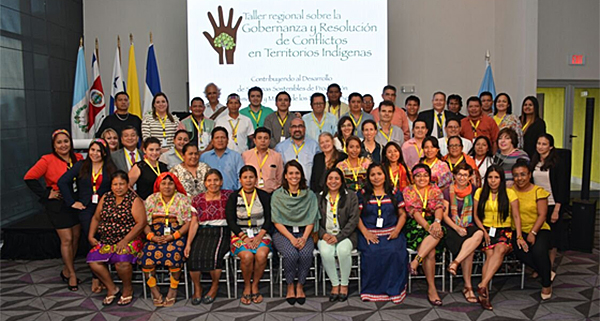 |
|---|
| © Ariel Atencio, ANATI |
As a follow up to the implementation of the VGGT and the outcomes of meetings held by the Inter-American Cadastre and Land Registry Network, with the collaboration of the Organization of American States, the World Bank and FAO, an event was organized on the subject of Territorial governance in indigenous territories, focused on the countries of the Mesoamerican region (El Salvador, Guatemala, Costa Rica, Panama and Colombia).
The workshop on Cadastre and Registry for Governance and Conflict Resolution took place from 28-30 May 2018 in Panama. It was organized by ANATI (Autoridad Nacional de Administración de Tierras), FAO, the World Bank and the Inter-American Cadastre and Registries Network. The workshop was attended by representatives of government institutions, Indigenous Peoples and civil organizations from Guatemala, El Salvador, Costa Rica, Panama and Colombia, as well as officials from FAO and the World Bank.
The participants shared experiences and elaborated recommendations on the management of indigenous territories and analyzed methodologies and instruments that strengthen collective rights of tenure and contribute to the resolution of conflicts, existing initiatives in terms of recognition of territorial rights of indigenous peoples and the role of cadastre and registration in the governance of those territories. The recommendations are directed to governments, international cooperation and indigenous organizations.
Read more
Regional Land Forum
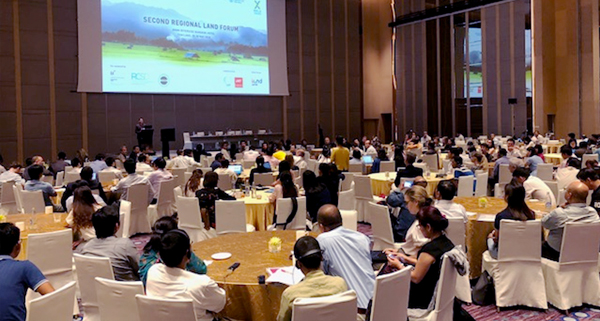 |
|---|
| © FAO / Marianna Bicchieri, FAORAP |
Bangkok - The Second Regional Land Forum, organized by the Mekong Region Land Governance (MRLG) project and FAO, held from 28 to 30 May 2018, provided a multi-stakeholder platform for networking and dialogue on land governance issues specifically related to responsible agricultural investment and recognition of customary tenure. Almost 300 participants, representing different constituencies, attended.
In countries where tenure rights are not clearly defined, large-scale land acquisitions raise particularly high risks for smallholder farmers and local communities who can lose access to and control over their natural resources and, consequently, their livelihoods.
The Forum aimed to bridge these divides by discussing alternatives to enhance tenure governance, promoting a different model of rural development, in which economic development challenges are met while human rights are respected. Instruments, such as the VGGT, are used to improve tenure governance in Cambodia, Lao PDR, Myanmar and Viet Nam.
Read more
The VGGT help improve management practices of the Agricultural Land Agency in Tunisia
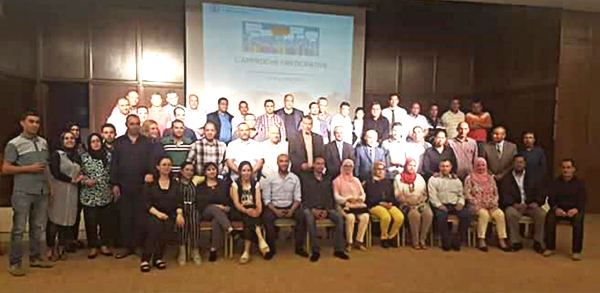 |
|---|
| © FAO / AFA-Tunisia |
From 10 to 12 May 2018 a first capacity development session to improve the management practices and approaches of the Agricultural Land Agency (AFA) in Tunisia was held in Mahdia (central Tunisia). Funded by the Swiss Agency for Development and Cooperation, the three day capacity development session allowed 65 AFA staff members from different parts of the country to share their experiences and find solutions to their daily challenges related to land management. A number of interactive sessions presented by FAO on participatory methodologies, “Free, Prior and Informed Consent” (FPIC) and on how to prevent and address disputes and conflicts over the tenure of natural resources, allowed AFA staff members to improve their land management practices in light of the VGGT principles and recommendations. Additionally, local experiences were used as case-studies for group work, which led to a contextualized FPIC manual aiming to guide and improve the practices of the Agricultural Land Agency.
26th Congress of the International Federation of Surveyors (FIG)
The Congress took place in Istanbul from 6-11 May 2018 and consisted of 63 technical sessions with over 2,300 participants. FIG, in partnership with FAO, organized three sessions to emphasize support for VGGT implementation.
At the session on ‘Best practices for land consolidation legislation’ in line with the VGGT there was a discussion on the need for comprehensive international technical assistance in the development of operational Land Consolidation (LC) programmes. FAO is currently preparing generic guidance for the development of LC legislation based on best regulatory practices in Europe and Central Asia. The guidance will be useful for the development of regulatory frameworks in countries developing national land consolidation programmes.
At the FIG Academic Forum on the VGGT, possibilities for the adoption and implementation of the VGGT in the surveying profession and professional education were discussed. Similar possibilities and related challenges were presented by countries: difficulties in raising awareness on the VGGT, teachers’ knowledge of the VGGT, strengthening collaboration between governments and academia and lack of financial resources.
At the round table on ‘Securing tenure rights, surveying and the VGGT’ there was a discussion on the need for active participation by communities and farmers when using new technologies (Open Tenure/SOLA, STDM, MAST and Cadasta) that support the recording and mapping of land rights under customary tenure. Land related documentation produced through these technologies needs to be integrated into the land administration system of the country in order to ensure full recognition and legalization of tenure rights. Surveyors and para-surveyors can train community members in the use of the technologies. This is key to developing capacity at local level to record and map land rights.
These key messages were shared in the final plenary session of the congress.
Read more
VGGT training workshop on Free, Prior and Informed Consent in Boghé, Mauritania
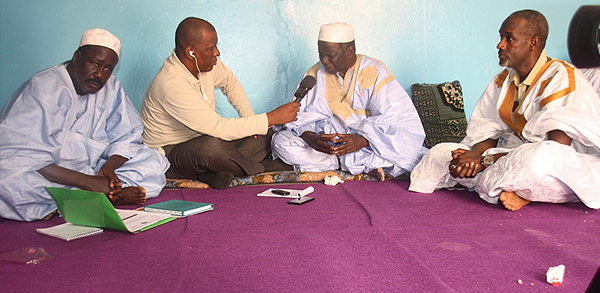 |
|---|
| © FAO / Ingeborg Gaarde |
The first local training workshop on Free, Prior and Informed Consent (FPIC) organized by IPAR and FAO, with the financial support of Germany, was held in Boghé, Mauritania from 24 to 25 April 2018. Around 50 participants attended the workshop, including representatives of the state and local authorities, producer organizations and women’s cooperatives, and was opened by the chief administrative officer of the department of Boghé. The aim of the workshop was to train national and local stakeholders to apply FPIC and present other tools to improve local tenure governance in Mauritania. The workshop was also an opportunity to share land governance tools developed by local partners. Throughout the training, participants analyzed FPIC application and processes in their local context and developed their own manual presenting reflections on how to guide future investment projects in Mauritania. The training ended with a set of recommendations, including a suggestion to replicate the training in other regions, to strengthen the capacities of stakeholders and to put in place an effective local, multi-stakeholder platform at the department level in the Brakna region.
IGAD Member States call for the establishment of a Pastoral Land Governance Platform
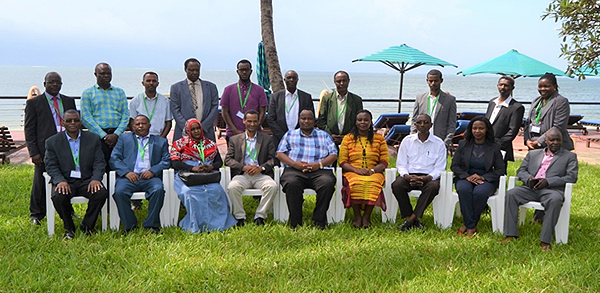 |
|---|
| © FAO SFE |
Mombasa, Kenya, 24-25 April 2018. In a workshop organized by the Intergovernmental Authority On Development (IGAD) Centre for Pastoral Areas and Livestock Development (ICPALD) in collaboration with the IGAD land governance project, IGAD Member States called for the establishment of a Pastoral Land Governance Platform. The meeting was attended by participants from IGAD Member States (Ethiopia, Kenya, Sudan and Uganda) representing land commissions, departments for land registration and land use planning in the Ministries responsible for land administration and livestock production.
The workshop’s objective was to enhance land policy convergence among IGAD member states with the aim of promoting sustainable development of pastoralism and exploring ways in which the AU Policy Framework on Pastoralism and the Framework and Guidelines on Land Policy in Africa (F&G) supported by the VGGT, could be used to improve the governance of pastoral lands.
At the close of the workshop, IGAD Member States called for the establishment of a multi-stakeholder Pastoral Land Governance Platform to convene government, academia, civil society, agricultural producers and pastoral associations to continue dialogue on governance of pastoral lands with a regional perspective. The Member States called on the African Land Policy Centre, FAO and the African Union Commission (AUC) to provide support in the establishment of the Pastoral Land Governance Platform and to raise awareness on the VGGT, F&G and AU Policy Framework on Pastoralism, as frameworks and tools available to support the enhancement of pastoral land governance at member states level in the IGAD region.
Read more
Togo: first VGGT workshop contributes to reflection on the new Land Code and recommends establishing a national multi-stakeholder platform to address tenure challenges
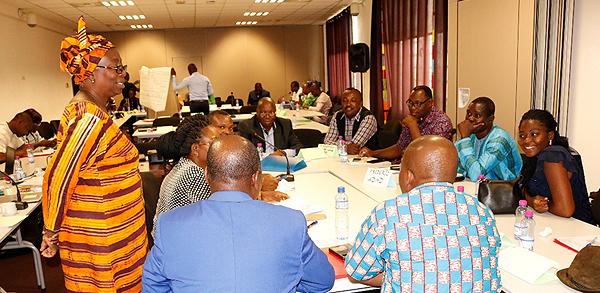 |
|---|
| © FAO / Ingeborg Gaarde |
The first national workshop on the VGGT in Togo was held from 4-5 April 2018. It was organized by the National Platform of the Global Convergence of Land and Water Struggles – West Africa (CGLTE OA) with technical and financial support from FAO. The workshop was opened by the Minister of Housing and Urban Development (le Ministre de l'urbanisme, de l'habitat et du cadre de vie) and was attended by 50 participants, including representatives from relevant ministries, deputy members of the National Assemblée, traditional chiefs, technical and financial partners as well as civil society representatives from Togo, Mali and Benin. The aim of the workshop was to raise awareness on the VGGT and discuss tenure issues, in particular, the new Land Code adopted on 5 June 2018 by the National Assembly. This document has integrated the Ten Implementation Principles of the VGGT (chapter 3B) as “fundamental options”.
The participants discussed how to make use of the VGGT and learned from the experiences of improving tenure governance in other countries. The workshop ended with a proposal to establish a national multi-stakeholder platform to address the country’s tenure challenges. The action plan developed by the participants included VGGT trainings at the community level to raise awareness on the new Land Code and to strengthen the capacities of local stakeholders to engage in tenure discussions.
Improving forest tenure
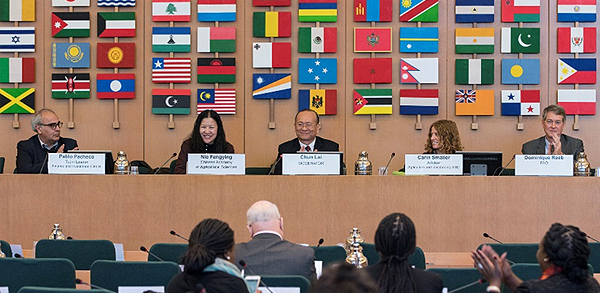 |
|---|
| © FAO / Marianna Bicchieri, FAORAP |
As part of the Collaborative Partnership on Forests (CPF), FAO hosted an international conference on Working across Sectors to Halt Deforestation and Increase Forest Area, from 20-22 February 2018 in Rome. A session on Improving Land Governance highlighted recent studies by FAO indicating that around 80% of global forest loss is due to conversion to large-scale and subsistence agriculture. Nearly 200 people participated from the government, civil society, NGOs, and the private sector to advance thinking on better practices to improve land governance.
In line with the VGGT, the session proposed that governments should: i) diversify and secure tenure to forests (rather than only to agricultural land) for communities and smallholders; ii) remove perverse incentives to clear forests; iii) maximize positive social and environmental impacts of investments through transparency in land deals, protection of local legitimate rights, and promotion of inclusive business models. The final messages for the UN High-Level Political Forum on Sustainable Development (HLPF) 2018 and the 13th session of the United Nations Forum on Forests (UNFF13) prioritized strengthening small producers and associated value chains. Strengthening of legitimate tenure to forests and agricultural land is a precondition for achieving these priorities.
Click here for the keynote presentation
FAO and partners support historic land tenure forum in Niger
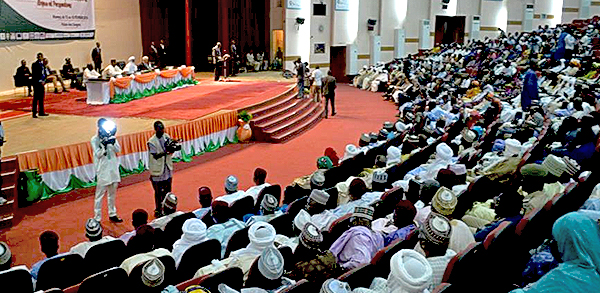 |
|---|
| © FAO / Agali Moumouni, FAONE |
From 13-16 February 2018, the États généraux du foncier rural (a land forum) was held in Niamey under the aegis of the President of the Republic of Niger. The forum was the culmination of a participatory process of engaging key stakeholder groups, such as representatives from key ministries, academia, traditional chiefs, parliamentarians, technical and financial partners (FAO support was funded by Italy and by the FAO Multipartner Programme Support Mechanism, FMM), the private sector and civil society actors from all regions of Niger, in an exhaustive stock-taking exercise on the tenure situation in the country. The forum was attended by more than 300 participants and resulted in an agreement on the direction for a national land policy to be developed with reference to the VGGT and the Framework & Guidelines on Land Policy in Africa (F&G). The forum also led to a set of recommendations, including a proposal to renew, enlarge and strengthen the national multi-actor committee in charge of preparing the États généraux to steer the process of elaborating the new land policy.
Read more
VGGT for community forest management in Paraguay
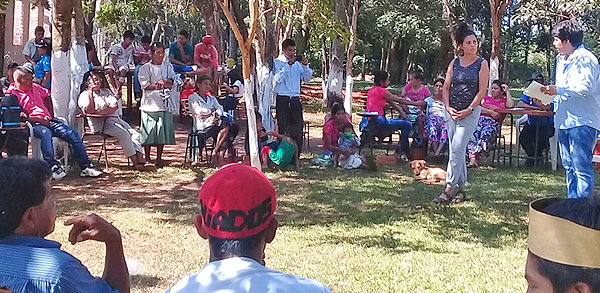 |
|---|
| © Almudena Garcia-Sastre |
What does a forest mean to the Mby’a Guaraní ethnic group? This question led a series of capacity building workshops on the guiding principles of the VGGT addressed to this indigenous group. The Mby’a Guaraní is one of 19 different ethnic groups living within the Paraguayan borders. The first step towards political dialogue on responsible governance entails the acknowledgement of the numerous values that land and forests have for indigenous people, socially, culturally, spiritually and environmentally over their economic value. The main purpose of these training sessions is to bolster the Mby’a Guaraní people's leadership through the recognition of their ecological knowledge and culture for the improvement of natural resources governance. Since December 2017, these workshops have been organized throughout the Eastern region, in Caaguazú, Guairá, Itapúa and Caazapá and have been coordinated by the Federation for the Self-Determination of Indigenous Peoples (FAPI), the Instituto Paraguayo del Indígena and FAO. These events provided a forum for 424 participants including indigenous leaders, women and youth. The main outcome pointed out the need to strengthen the capacities of indigenous communities to fully participate in the decision-making affecting their territories.
Uzbekistan unlocks the development potential of geospatial information and services
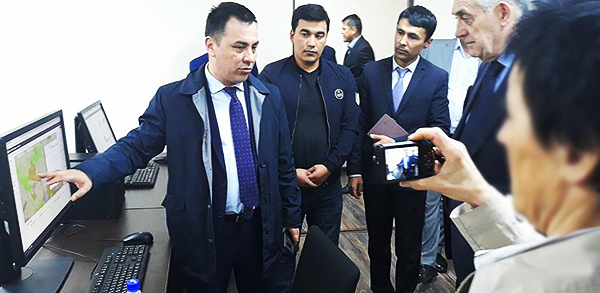 |
|---|
| © Gulnoza Ahmedova, GosKomZemGeodezKadastr |
In December 2017, the government of Uzbekistan reformed the regulatory framework for geospatial information and services as part of the Modernization of Real Property Registration and Cadastre project by adopting the open, non-classified World Geodetic System (WGS-84) as a national standard. Prior to the reform, all detailed and precise geospatial data including land tenure records were classified because of secret geodetic coordinates, and could not be accessed, shared and disseminated openly on the internet. The amendment enables development and open access to a comprehensive National Geographic Information System for government agencies, civil society, businesses and the general public. Open access to digital fundamental geospatial datasets, like base maps and cadastral maps and location based services employing modern geospatial technologies, boosts economic development by underpinning efficient, evidence based decisions made by the authorities, and the responsible governance of land and other natural resources. The project is financed by the World Bank and supported by FAO through the Investment Centre.
New publications
TG 6 Improving Governance of Pastoral Lands (Russian)
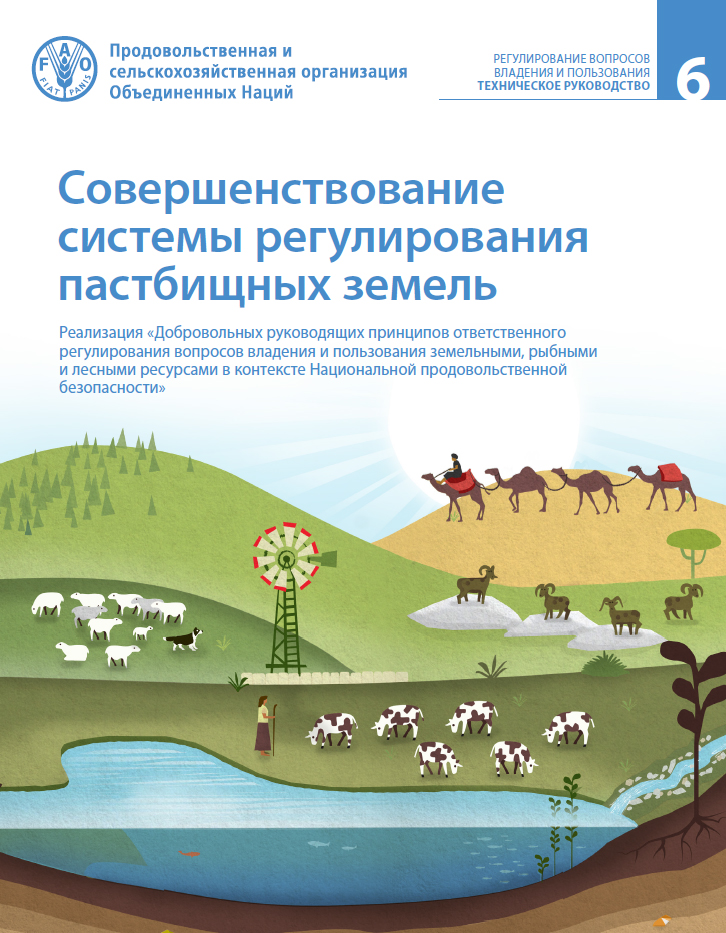 |
|---|
The guide builds on a number of initiatives and studies from recent years that have shone a light on pastoral governance and land tenure: on the inherent challenges pastoralists face, the shortcomings of governments in securing pastoral tenure, and the emerging examples of success and progress from around the world. This guide provides solutions to securing pastoral governance and tenure without undermining the inherent, necessary complexity of customary arrangements. The solutions are within a rapidly changing context, in which traditional practices and crucial patterns of livestock mobility are transforming.
Also available in EN FR Portoguese AR Chinese
The VGGT and Technical Guide 6: Improving Governance of Pastoral Lands are now available in Mongolian. A comic that explains the VGGTs and the importance of it to Mongolian herders has also been created, with funding by the FAO Multipartner Programme Support Mechanism (FMM).
E-learnings
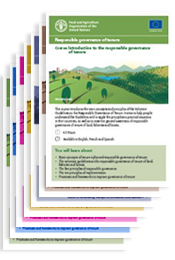 |
|---|
A wide variety of e-learning courses are available on the Responsible Governance of Tenure. Learn about:
- making access to land, fisheries and forests more equitable
- how to protect people's tenure rights
- options to simplify the administration of tenure and make it accessible to all
- how to ensure disputes are resolved before they degenerate into conflict
Browse all Responsible Governance of Tenure e-learning courses
Save the date!
The Food and Agriculture Organization of the United Nations together with the Ministry of Oceans and Fisheries, Republic of Korea are co-organizing the global conference “Tenure and UserRights 2018: Achieving Sustainable Development Goals by 2030” (UserRights 2018) in Yeosu, Republic of Korea, 10 - 14 September 2018.
Participation at UserRights 2018 is open and free to all. There is no registration fee.
Conference website
